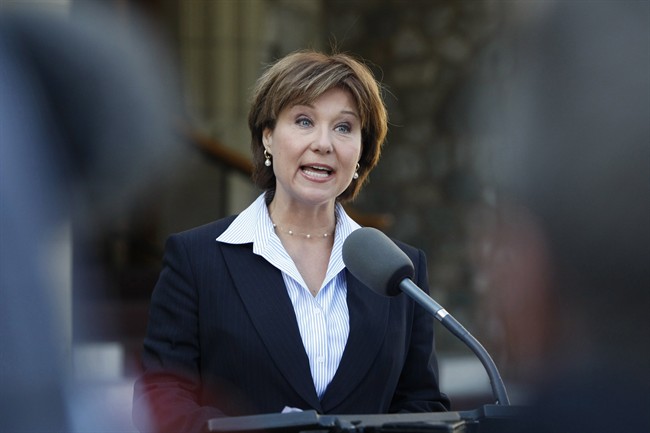VANCOUVER – It’s not hard to imagine Christy Clark in pigtails on the playground, organizing votes on recess games, debating teachers about the quality of extracurricular activities on offer.

A look at the career path of the B.C. Liberal leader and 35th premier of British Columbia leaves little doubt that the province’s top job is one she has had her eyes on for much of her life.
Her father, Jim, a school teacher, ran unsuccessfully under the Liberal banner three times when Clark was a child and she’s credited his political interests for setting her on the path.
“In all the days that I’ve known her, she’s been partisan to the core and motivated, above all, by politics and political considerations,” says Martyn Brown, who was chief of staff to Clark’s predecessor, former B.C. premier Gordon Campbell.
“She said she had a passion for politics since she was a kid, steeped in politics through her family and I think she always had designs to run and be elected and probably surprised herself by her ability to succeed and become the premier of B.C.”
Christina Joan Clark was born Oct. 29, 1965, and raised in Burnaby by Mavis and Jim Clark, the youngest of their four children.
In a half-hour paid television spot that aired ahead of the election call, black-and-white family photos show Clark’s 1960s-era family in all their wide-lapelled, polyestered glory.
“We lived in a three-bedroom house with six people in it. We had this old, four-door, blue rambler station wagon,” Clark says.
A montage of Kodacolor images show her parents smiling crouched beside a canoe, then the whole family smiling and laughing in a lush garden.
She graduated from Burnaby South Senior Secondary in 1983 and by the time she was in university, she was president of the Young Liberals. At Simon Fraser University, she first won a position on the student society in 1988, according to an article in the university newspaper, The Peak.
The next year, Clark ran for president of the SFU Student Society and won by a slim margin, only to be disqualified. Clark had failed to pay fines for breaking campaign rules, the article said. She fought the decision, threatened legal action and ultimately ran in the byelection to fill the position. She lost.
Clark left Simon Fraser and headed overseas, where she spent the next several years studying at the University of Edinburgh and the Sorbonne in Paris. It’s unclear whether Clark ever graduated with a degree from any of the schools. Her campaign team was unable to confirm her graduation.
Nonetheless, by the early 1990s she was in Ottawa, working as an advisor in the federal Liberal government. In 1996, she was first elected to the B.C. legislature among a cohort of young Liberals under the leadership of Gordon Campbell.
Clark soon earned a reputation as a bruising Opposition member, whose attacks had to be tempered more than once by the Speaker. In 2001, she was part of the Liberal sweep that formed government.
She gave birth to her son the same year, and a profile in Macleans magazine noted that she returned to work a month later.
“Politics is her thing,” says George Abbott, the former Liberal cabinet minister and one of Clark’s rivals for the Liberal leadership.
“She loves the give and take. She loves the campaign trail and this is where she’ll need to thrive if the B.C. Liberals have any hope of returning to government.”
Abbott, who was the most aggressively critical of Clark during the leadership race, only alludes to Clark’s style of politics — a brazen style that left some of those who dealt with her as education minister still seething a decade later when she returned to politics as the Liberal leader.
“I think she is superior in terms of her work as a politician and the fact that she was able to win the Liberal leadership is certainly a testament to her political skills,” he says.
Indeed, Clark won the party helm with the support of only a single Liberal caucus member after a five-year absence from Victoria. She had resigned in 2005, saying she wanted to spend more time with her young son.
In 2005, she launched an unsuccessful bid to be a Vancouver mayoral candidate and went on to be a successful radio talk show host.
Clark’s online biography says she’s received the YWCA Woman of Distinction Award and was named the 2009 Woman of the Year in B.C. by the Consumer Choice Awards.
When she threw her hat in the leadership ring, Abbott says nobody was surprised.
“She had been attending B.C. Liberal conventions, having high-profile hospitality suites and so on, even after leaving. So she was keeping her profile up in the party and continuing to build,” Abbott says.
She’s a charming person who has a “very significant challenge” ahead, says Abbott, now a professor of political science at the University of Victoria.
After inheriting an unpopular party, the decline has continued. Several high-profile gaffes have left Clark as much as 20 points behind in opinion polls.
“That’s a big margin to try to close. It will be her greatest test as a politician, I think, to see whether in fact that gap can be closed in any significant way. Does she have the political skills to do that? I think yes, she does,” says Abbott.
Brown is less positive.
“She was elected by her party because people believed that she was a different kind of leader who was genuine and sincere about changing the tenor of politics and I think she lost that ground almost from the outset,” he says.
Voters will be the judge of that on May 14 — two years to the day that she was sworn in as premier.



Comments